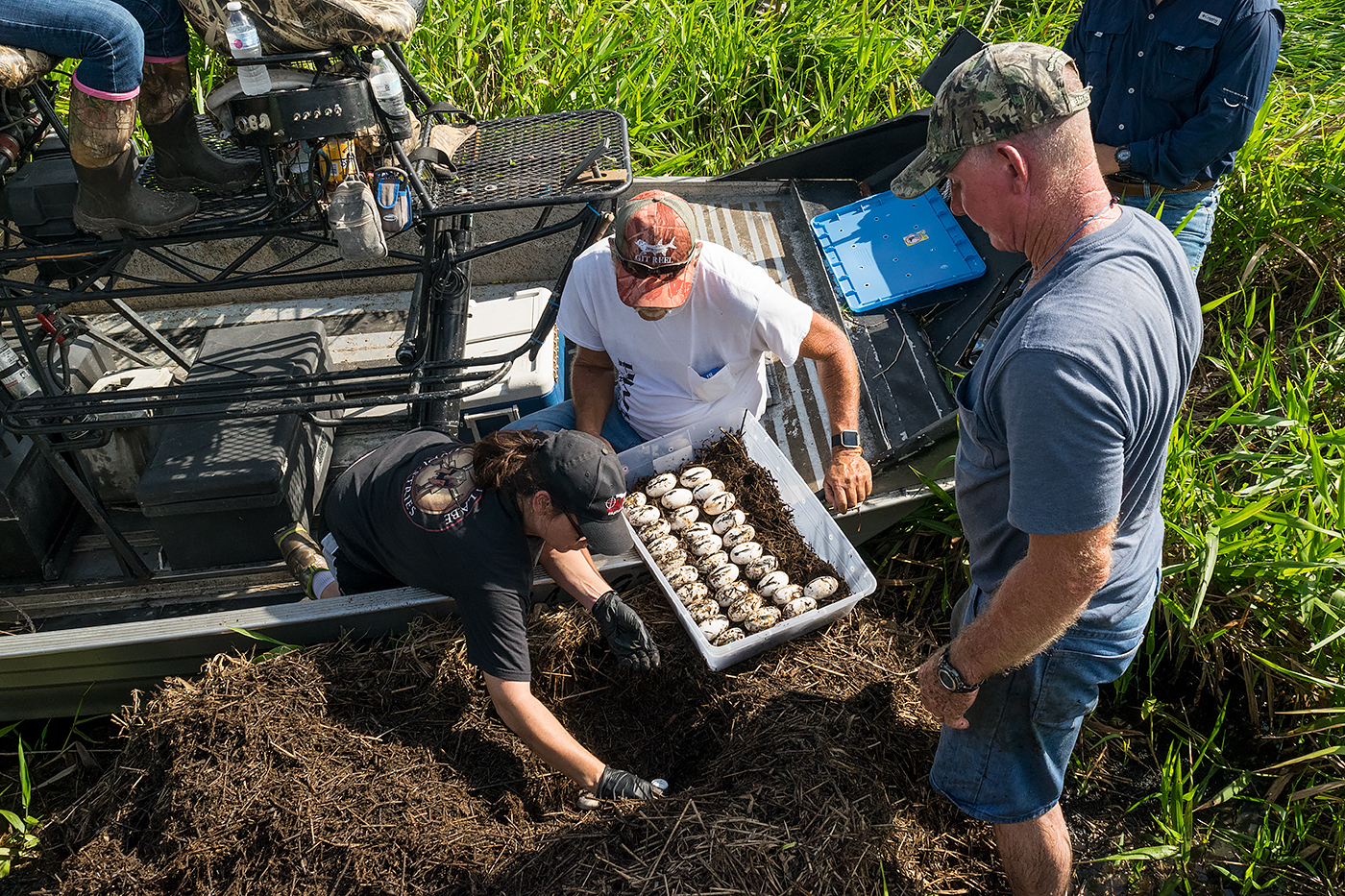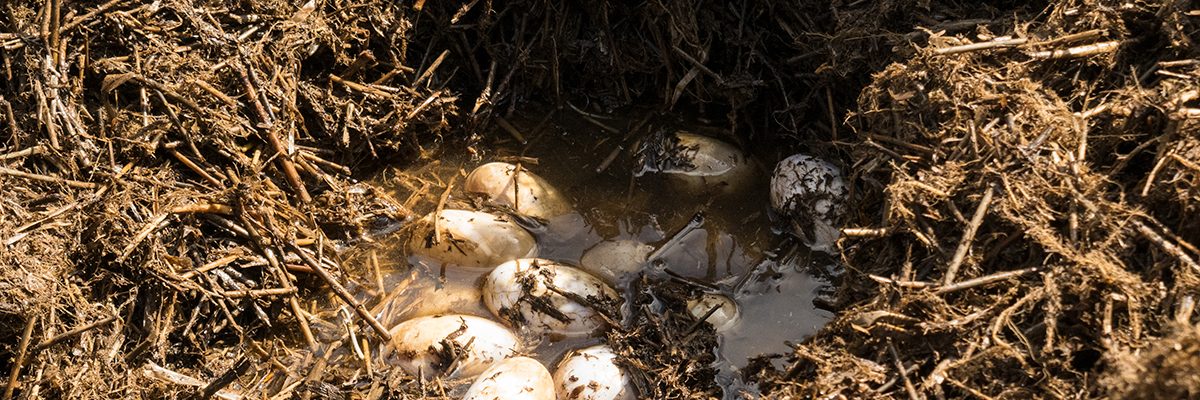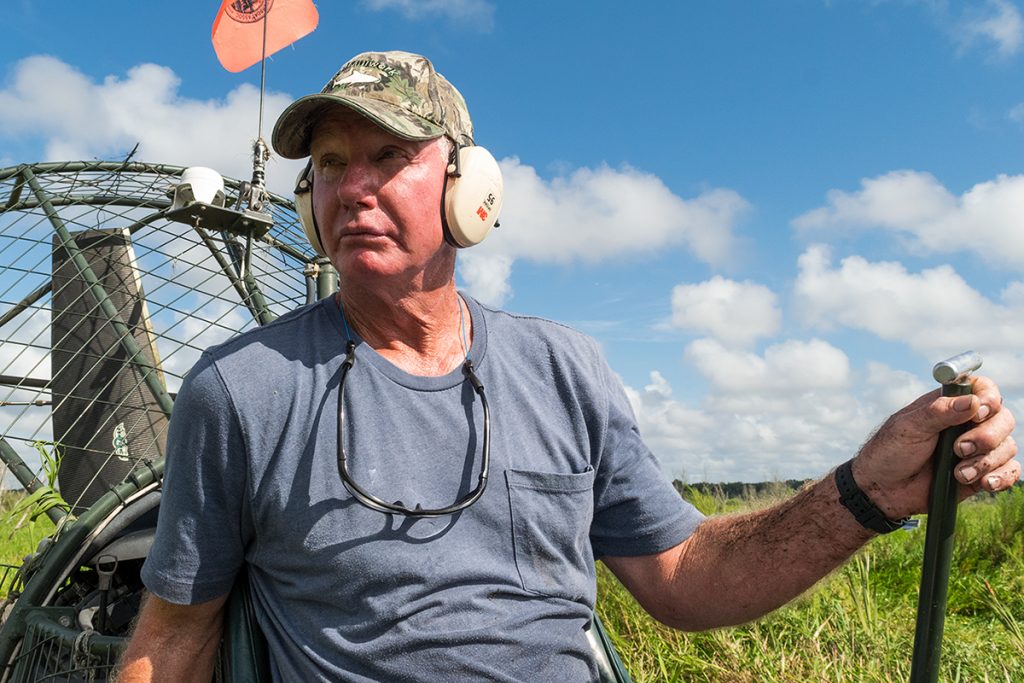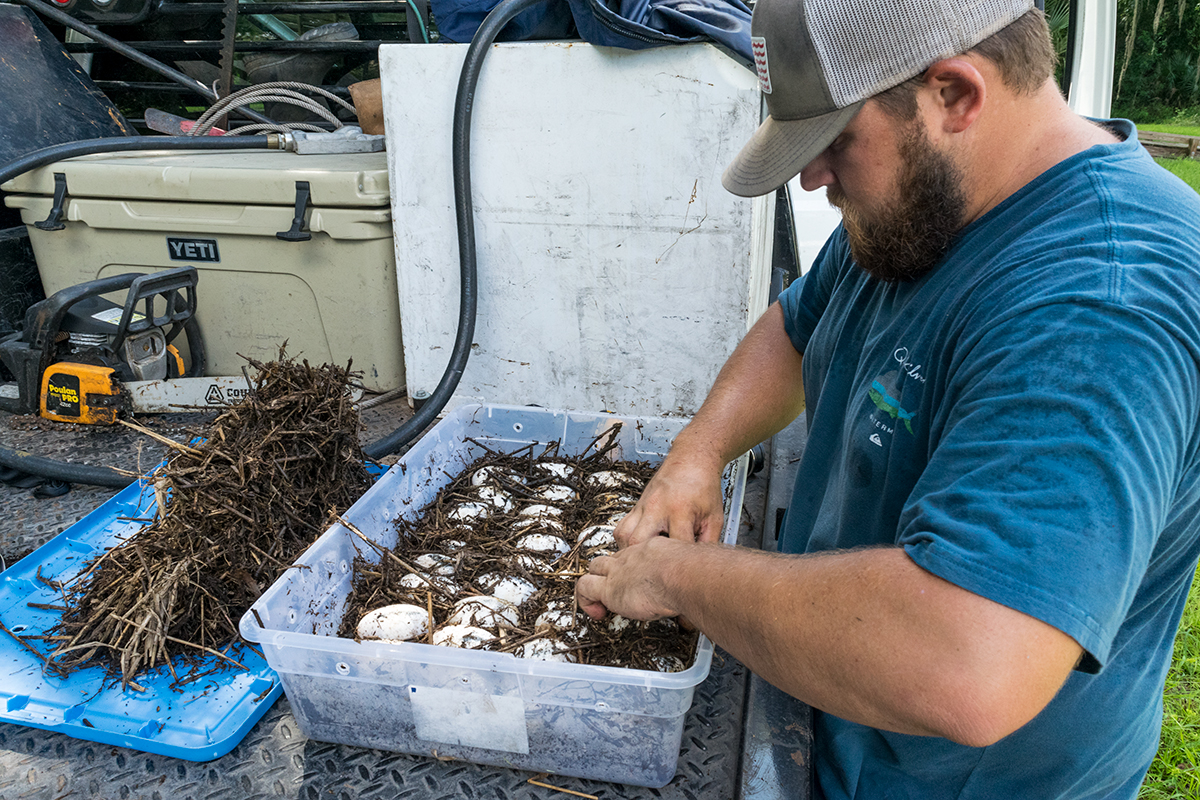Egg hunt supports activities for disabled veterans, stabilizes alligator population
Scott Swartley’s airboat roars across the glassy waters of Orange Creek Restoration Area in Alachua County. It’s only 9 a.m. and the summer humidity is palpable, something akin to breathing through a hot, wet towel wrapped around your face. Swartley kills the engine and glides the airboat to his first stop: a mound of leaves, dirt and twigs dusted with fire ants. An alligator nest.
“Be careful of red ants in the nest,” Swartley warns his passengers. “Make sure to put on your rubber gloves in case of any bacteria in the nest. These eggs obviously haven’t been sanitized and may be covered with salmonella or vibrio bacteria. Recently scratched ant bites allow for infection if you don’t wear protective gloves.”
Swartley knows his way around a marsh. The professional airboat tour operator has been helping harvest alligator eggs for 20 years. Today, however, is special. He’s helping the St. Johns River Water Management District and the Florida Forest Service escort three Army veterans on an alligator egg collection to raise money for Operation Outdoor Freedom. Operation Outdoor Freedom provides wounded veterans with organized outdoor activities that they enjoy at no cost. Designated state and agricultural lands throughout Florida offer these veterans unique opportunities for recreation and rehabilitation. The Florida Forest Service operates the program.

Wounded veterans participate in an alligator egg harvest through the Operation Outdoor Freedom Program.
Harvesting actually helps stabilize wild alligator numbers. Alligator egg harvesting is regulated by FWC. FWC biologists have calculated the number of nests that can be harvested while sustaining healthy populations of alligators and the animals that consider alligator eggs and babies as prey.
“The program is open to veterans from all conflicts,” says David Hunt, statewide program coordinator for Operation Outdoor Freedom. “We couldn’t do a lot of what we do for veterans without partnerships with the water management district, Florida Fish and Wildlife Conservation Commission (FWC) and other public and private landowners.”
Participants have either been awarded the Purple Heart or have a service-related disability rating of 30 percent or greater. The activities offered through Operation Outdoor Freedom offer them the chance to rub shoulders and share in a few hours of camaraderie with one another. More than 3,000 veterans have participated in the program since its inception in 2011. In 2017, vets participated in 95 Operation Outdoor Freedom activities statewide.
“Forestry staff come up with ideas for activities that have included scuba diving, lobster hunting, canoeing and many hunts,” Hunt says. “Raffles and fundraisers bring the community together while ensuring no tax dollars are being used for a program that says ‘thank you’ to our veterans for their service.”
Veterans volunteering in the egg hunt soon realize that it’s a treacherous life for alligators living in the wild. When the airboat armada arrives at one nest, the group discovers brown eggs instead of white. Swartley explains that high water levels have ruined all but two eggs, one of many disasters that can befall the unborn reptiles. Eggs can be crushed by the mother alligator, eaten by raccoons and other predators or even dehydrate in extreme heat. Hatchlings don’t fare much better. For nests that survive predators and flooding, an estimated 24 live hatchlings will emerge. Only 10 alligator hatchlings will live to one year.
Another tidbit the veterans learn: an alligator’s gender is determined by the temperature at which the eggs are incubated. High temperatures of 90 to 93 Fahrenheit result in males; low temperatures of 82 to 86 Fahrenheit yield females. Temperatures in the middle produce a mix of genders.
Courtship begins in early April, and mating occurs in May or June. Females build a mound nest of soil, vegetation or debris and deposit an average of 32 to 46 eggs in late June or early July. Incubation requires approximately 63–68 days, and hatching occurs from mid-August through early September.
Alligator egg harvesting is regulated by FWC. FWC biologists have calculated the number of nests that can be harvested while sustaining healthy populations of alligators and the animals that consider alligator eggs and babies as prey.
Operation Outdoor Freedom is a program of the Florida Department of Agriculture and Consumer Services, Florida Forest Service. For information about eligibility, visit this page.
The district’s annual egg harvesting program may seem to contradict the ethos of the agency, but harvesting actually helps stabilize wild alligator numbers. Alligator egg harvesting is regulated by FWC. FWC biologists have calculated the number of nests that can be harvested while sustaining healthy populations of alligators and the animals that consider alligator eggs and babies as prey.
“There’s a natural surplus of eggs out here. We conduct a lot of management activities that create habitat conditions to ensure wildlife thrives,” says St. Johns River Water Management District Land Manager Jeremy Olson, who works closely with Florida Forest Service on orchestrating the egg hunt. “A lot of times with these events, it’s not so much about collecting the eggs as it is to see people who’ve had similar experiences getting together. The camaraderie is an important aspect of what we do.”
Alligator egg harvesting occurs at a handful of district properties. Money the district receives for the eggs is used for various district land management programs. Funds raised from egg harvests at Orange Creek Restoration Area are dedicated to Operation Outdoor Freedom. Alligator farms buy the eggs to raise alligators to harvest their hides. Egg prices vary with market trends, but in 2017 individual eggs were valued between $20 and $30, which goes a long way toward funding Operation Outdoor Freedom. By the morning’s end, the group had collected 212 eggs.
Army veteran Marna Tracy, who owns a gun shop in Tampa, took a day off from work to participate in the egg hunt. She’s grateful for the activities offered through Operation Outdoor Freedom.
“I tell any of my customers who qualify for the program that they have to try it,” Tracy says. “I’ve participated in two alligator events, a sporting clay shoot and deep sea fishing through Operation Outdoor Freedom. It’s a wonderful program.”
The morning’s adventure concluded with a simple picnic of burgers and hot dogs on an open flame, group photographs and the promise of future outdoor activities for Florida’s wounded veterans.
Note: This article originally appeared in the winter 2018 edition (January 2018) of the district’s StreamLines publication.




